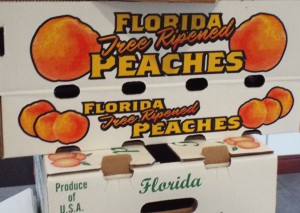 The 2015 Fall Peach Seminar was held at the Univ. of Florida/IFAS Gulf Coast Research Center Thursday, 9/17 and the expected attendance was around 50-60 people. However, much to the surprise and delight of the meeting’s sponsors and organizers nearly 120 people attended to learn more about this alternative crop for Florida. When people think of agriculture in Florida, citrus is number one and peaches are king in Georgia. Now Florida is venturing into the peach industry with growers and industry representatives becoming more and more interested in this delicious and versatile fruit.
The 2015 Fall Peach Seminar was held at the Univ. of Florida/IFAS Gulf Coast Research Center Thursday, 9/17 and the expected attendance was around 50-60 people. However, much to the surprise and delight of the meeting’s sponsors and organizers nearly 120 people attended to learn more about this alternative crop for Florida. When people think of agriculture in Florida, citrus is number one and peaches are king in Georgia. Now Florida is venturing into the peach industry with growers and industry representatives becoming more and more interested in this delicious and versatile fruit.
Peaches are one of the top ten choices by kids as a fruit option. Great in smoothies, pies, cut fresh in salads, and who doesn’t like a warm peach cobbler? A large peach only has about 65 calories and plenty of vitamin C. Nutritious and delicious, there presently seven varieties that grow well in Florida and the University of Florida/IFAS continues to work on new varieties for our warm, subtropical climate.
Nine speakers were present at the event on Thursday at GCREC and subjects included disease, weed, and pest management as well as a variety update, post-harvest information and a marketing order round table discussion. Peaches do require a little more maintenance that a citrus grove. However with the devastating effects from citrus greening, some citrus growers are looking at alternative crops to replace or supplement their fields. Peaches are just one of the possible options along with pomegranates and blueberries.
At Gulf Coast Research and Education, we seek out alternative crops and research the viability of those crops for central Florida growers. It’s exiting to have the opportunity to try something new while continuing to improve upon the established crops in Florida. Science is about satisfying curiosity and we work to question, reason and find solutions to agricultural challenges for our area growers.
Farmers are known for their ingenuity and creativity when it comes growing fruits and vegetables. Most times, they don’t have a choice. Weather, pests, soil issues, disease, and market values force them to think outside the box in order to make a profit or in some cases just break even. As Florida growers look for new agricultural prospects, IFAS researchers will continue their efforts to expand the number of choices to be made available and keep Florida in one of the top spots for agriculture.
Stay tuned and watch the face of Florida agriculture change into a more diverse landscape.
 0
0
